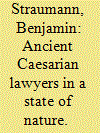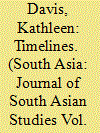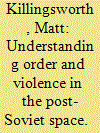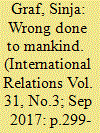| Srl | Item |
| 1 |
ID:
069782


|
|
|
| 2 |
ID:
154194


|
|
|
| 3 |
ID:
137262


|
|
|
|
|
| Summary/Abstract |
This essay advances an argument regarding the structure of periodisation and the ways in which it limits critique of imperial historiography. It focuses first on the history and structure of medieval/modern periodisation and its relationship to the more recently popular ‘early modern’, and then turns briefly to the historiography of feudalism, an important anchor of the period concept, ‘the Middle Ages’. It then attends in more detail to the historiography of secularisation, particularly the recent tendency to find a secularising impulse in the texts of ‘early modern’ authors such as Vitoria and Grotius, which ultimately reinscribes the imperial logic that Subaltern Studies has worked to critique.
|
|
|
|
|
|
|
|
|
|
|
|
|
|
|
|
| 4 |
ID:
112795


|
|
|
|
|
| Publication |
2012.
|
| Summary/Abstract |
Following the end of the Cold War, the discipline of international relations has benefited from a plethora of old, new and hybrid approaches to understanding order and violence. Yet amidst the scholarship on 'new wars', neo-medievalism and a range of alternative approaches such as human and critical security, the goal of understanding the motives, nature and limitations of contemporary uses of force remains elusive. This article attempts to shed light on this issue by reconsidering three traditions in conceptualising order and violence: the Grotian, Kantian and Clausewitzian traditions. It applies the respective emphases of each (legitimacy and law; moral imperatives; and Realpolitik) to the two Chechen wars and the 2008 Russo-Georgian war. The article demonstrates that while the prescriptive elements of the normative Grotian and Kantian traditions may well reflect the future trajectory of political violence, war continues to be fought for clear political motives relating to statehood and power. Based on the cases assessed here, the Clausewitzian tradition remains the most appropriate way to understand violent conflict in the post-Soviet space.
|
|
|
|
|
|
|
|
|
|
|
|
|
|
|
|
| 5 |
ID:
155789


|
|
|
|
|
| Summary/Abstract |
Current debates on ‘crimes against humanity’ address its history and its potentially neo-imperial effects in international relations. In reference to these issues, this essay abstracts the idea of universal crime from the contemporary concept of ‘crimes against humanity’ and analyzes its mobilizations in early-modern perspectives on the legitimacy of European colonialism. First theorizing the easy union between notions of universal crime and arguments about European imperialism, I then draw on arguments by Vitoria, Gentili, and Grotius. I find that they rely on the idea of an offense injuring all mankind to negotiate colonial relationships between European powers and peoples abroad as well as between European powers vis-à-vis one another, both within Europe and in non-European spaces. The essay concludes by offering three venues for inquiry into the concepts of universal crime and crimes against humanity, namely their political productivity, their historical circulation, and their contemporary neo-imperial character.
|
|
|
|
|
|
|
|
|
|
|
|
|
|
|
|